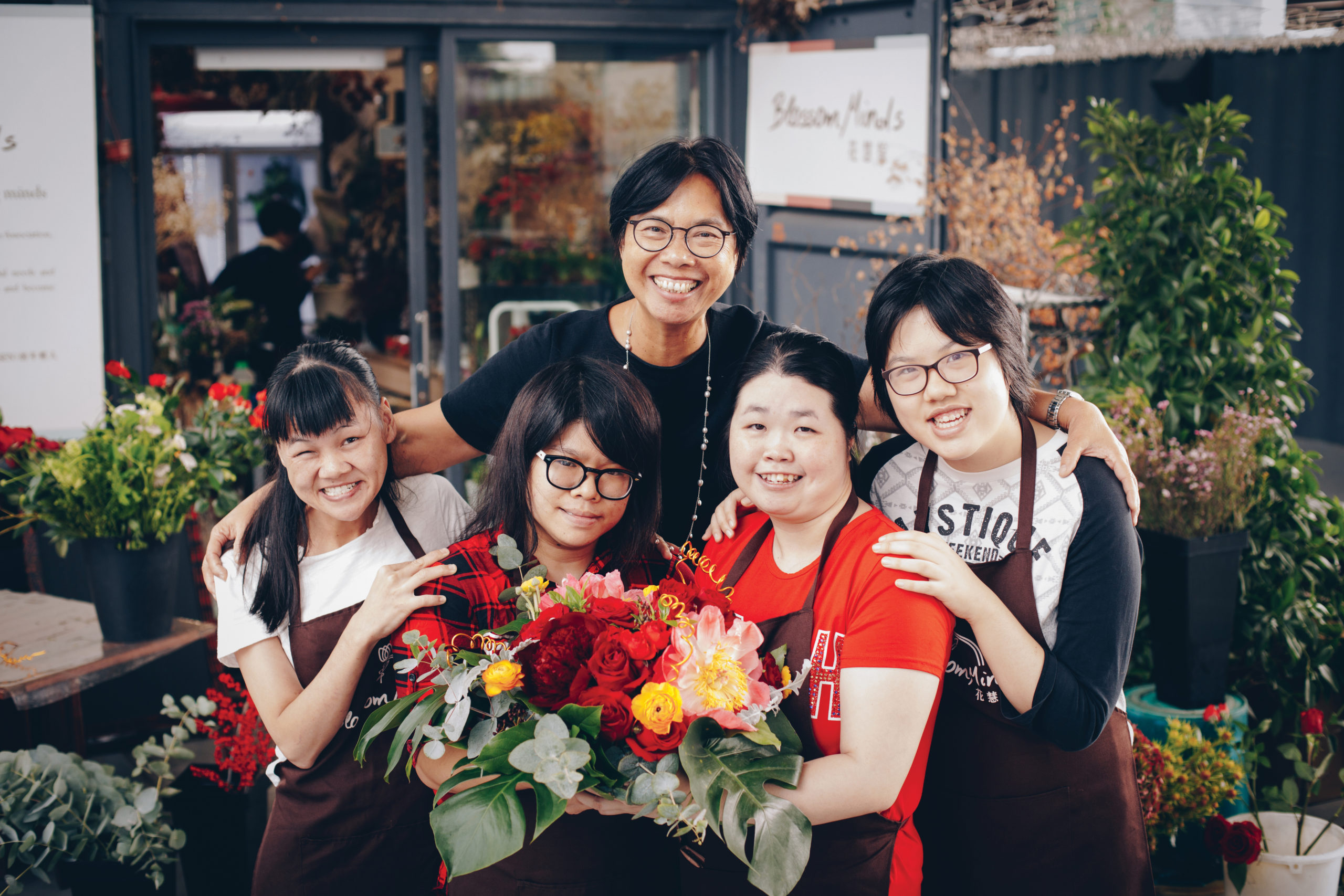In the past five years, the number of Hong Kong students with special educational needs (SEN) attending special schools remained fairly stable, at 7,700-7,900 per annum. But, in the same period, there was an increasing trend for such students to study in mainstream schools; in fact, their number grew by 34.1% to 45,360 and, by the 2017-2018 school year, they accounted for 7.8% of primary and 8.6% of secondary school students. So educational provision for SEN in Hong Kong is good, with a clear focus on education in the mainstream wherever possible. But what happens when these students reach the end of their secondary education? What employment prospects can they hope for? One local organisation is trying to give these young adults a more promising, rewarding and stimulating future in the mainstream world of work . . .

Blossom Minds enables these young adults with differences to explore their potential through the art of flower arranging.
Blossom Minds is a flower-arranging business, providing beautiful floral displays for hotels, restaurants and board rooms throughout Hong Kong, as well as selling displays as personal gifts. But what makes Blossom Minds different is that it is staffed by young adults with special needs and special educational needs (SEN). It employs ten such students, with varying developmental needs.
Blossom Minds enables these young adults with differences to explore their potential through the art of flower arranging. With training and motivation, it helps them improve their sense of self-worth and achievement, and provides a rare opportunity to play a full role in the employment mainstream.
The driving force behind Blossom Minds is Anita Ellis, who founded the Learning Support Services Association (LSSA) in 2012. LSSA supports inclusive education, and has been actively working with schools in Hong Kong, adding value to their learning support systems and helping students with SEN to learn positive behaviours, as well as coaching parents of SEN children, using positive parenting strategies.
“They receive on-the-job training and undergo training programmes on flower arranging skills, shop operation, etc. They also receive training on work ethics, and interaction with colleagues and customers.”
A more positive approach
Anita has been working with students with SEN for over 10 years. “Education and business are very different in many aspects; but both are dealing with people, simply with different outcomes,” she begins. “Working for people with SEN or special needs challenges us, whether as an employer, or a manager, or an educator, to think more from their perspectives - in particular, how we meet their individual developmental needs and cultivate their unique strengths and personalities.
“The employment community tends to look at young adults’ capabilities from a weaknesses perspective (what they can’t do) instead of the more positive approach of giving them opportunities to develop their strengths. To me, flower arranging is a step-by-step process with guidelines, that is fun and creative. My experience working with students with SEN suggested this might work well as an occupation for young adults with SEN.
“So Blossom Minds’ blueprint was developed in summer 2017, and the concept was tested among 10 young adults with special needs, and their parents. Branding, product design, sourcing, sales and marketing and logistics were in place by the end of 2017, and Blossom Minds was officially launched with four start-up clients in January 2018.”
Tailored training and supervision
She continues: “Our colleagues are recruited from special needs and mainstream secondary schools, other non-governmental organisations (NGOs) and the Government’s Labour Department. They receive on-the-job training and undergo training programmes on flower arranging skills, shop operation, etc. They also receive training on work ethics, and interaction with colleagues and customers. We hold staff appraisals every 6 months, to help each colleague voice their aspirations, in addition to receiving a performance review.”
Blossom Minds colleagues are categorised on three levels: Level 1 are those who are more independent, and capable of flower arranging with minimal guidance; while Level 2 are not fully independent yet, but have potential to work in the mainstream. Levels 1 and 2 are closely guided by Blossom Minds’ florists and shop manager. Level 3 are those who require mostly 1-1 supervision, but are eager to work in a mainstream environment; they only work on Fridays.
As part of its own ongoing CSR programme, Hactl commissioned Blossom Minds to produce the beautiful table floral centre-pieces for a prestigious event which it hosted recently. Hactl felt Blossom Minds was a worthy follow-up to its previous collaborations with local guide dogs and disabilities and special needs charities.
A charity run on business lines
Blossom Minds is an NGO, but it’s a self-sustaining operation run on commercial lines. Anita continues: “We need regular customers to maintain regular employment for the young adults and sustain the business long term. We also want to raise awareness among the business community on the capabilities of these young adults; I really hope that we can share our positive experiences with a wider group of employers and so increase their employment opportunities.”
Blossom Minds also relies on the generosity of sponsors to help with costs such as training and the rent of its shop. Future sponsorship will continue to focus on these two areas.

